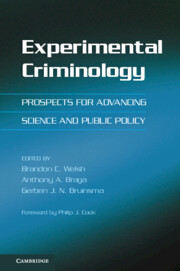Book contents
- Frontmatter
- Contents
- Contributors
- Foreword
- Preface
- 1 Experimenting with Crime and Criminal Justice
- Part I Experimenting with Crime
- Part II Experimenting with Crime Prevention and Criminal Justice
- 6 Randomized Experiments in Criminology
- 7 Increasing Equivalence in Small-Sample Place-Based Experiments
- 8 Multisite Randomized Trials in Criminology
- 9 Using Regression Discontinuity Designs in Crime Research
- 10 Quasi-Experimentation When Random Assignment Is Not Possible
- Part III Assessing Research Evidence and Future Directions
- Index
- References
9 - Using Regression Discontinuity Designs in Crime Research
Published online by Cambridge University Press: 05 June 2014
- Frontmatter
- Contents
- Contributors
- Foreword
- Preface
- 1 Experimenting with Crime and Criminal Justice
- Part I Experimenting with Crime
- Part II Experimenting with Crime Prevention and Criminal Justice
- 6 Randomized Experiments in Criminology
- 7 Increasing Equivalence in Small-Sample Place-Based Experiments
- 8 Multisite Randomized Trials in Criminology
- 9 Using Regression Discontinuity Designs in Crime Research
- 10 Quasi-Experimentation When Random Assignment Is Not Possible
- Part III Assessing Research Evidence and Future Directions
- Index
- References
Summary
INTRODUCTION
Some of the most interesting and important questions in criminology are causal in nature: Does neighborhood disadvantage influence an individual’s risk of criminal involvement? Does drug treatment work? Do changes in the threat of punishment deter crime? Distinguishing between causation and mere correlation is central to developing, testing, and refining our theories about the determinants of criminal behavior, most of which build on basic facts about how different constructs are causally related to one another. The distinction between statistical correlations and causal relationships is also of more than just academic interest, as most policy decisions hinge on causal questions. Getting the wrong answers to these questions leads to misguided policies that divert resources away from more effective alternatives, and sometimes even impose direct harm on society as well.
Although everyone in empirical criminology recognizes the challenges to valid causal inference created by the threat of omitted variables, the field remains divided about the most constructive way to proceed. One camp is often viewed as having adopted a purist, “randomized-trial-or-bust” perspective – a group that Sampson (2010) calls “randomistas.” Another camp consists of those we would call “research pluralists,” who are happy to consider findings from any sort of research design on a case-by-case basis.
Information
- Type
- Chapter
- Information
- Experimental CriminologyProspects for Advancing Science and Public Policy, pp. 194 - 222Publisher: Cambridge University PressPrint publication year: 2013
References
Accessibility standard: Unknown
Why this information is here
This section outlines the accessibility features of this content - including support for screen readers, full keyboard navigation and high-contrast display options. This may not be relevant for you.Accessibility Information
- 3
- Cited by
